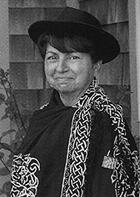(B)Orderlands’ Lullaby: The Song of the Entremundista
 Adela C. Licona
Adela C. Licona
Santa Maria Madre de Dios
Lulled into a shared state of grace
By the three voices of our Mema’s,
Rhythmically (en)chanting, chanting
Suplicandole a la Señora
Con el canto del rosario
Spoken word, in unison,
Fervently by la Tía Adela,
Distractedly by the Mema,
Melodically by Tatá.
Ruega por nosotros
The sounds of a far-a-way train,
The smell of freshly watered cement,
The creak of the metal glider on the porch.
Before our eyes, borderlands’ contradictions.
The (im)pure.
The (im)proper.
The (in)authentic.
And the (un)real.
Electricity and water run only on one side
of this river with two names.
Ahora y en la hora
Nepantleras on our daily pilgrimages.
Peregrinations. Transmogrifications.
Transported, deported, to a homelands of sorts,
At once familiar and unknown,
Unknowable, mystical,
Ni aqui ~ ni alla,
Un lugar liminal.
The space between this world and (an)Other.
Our bodies enduring the desert heat,
Peccadillos melting away like noontime raspas.
De nuestra muerte
Sun setting in brilliant hues of pink and orange and yellow.
Transgressions released, all mystery resolved,
Beauty bathes this (b)order now,
(Dis)illusion permeates our beings,
And for a moment we are (im)pure once again…
Amen.
working notes
“Borderlands’ Lullaby: The Song of the Entremundista” traces the familial, cultural, classed, gendered, and geographic places and practices that inform my own nepantlera worldview and lived experience. This poem reflects an evening ritual at the home of my grandmother – mi mema – and her sisters, my great aunts – mis tias. There the three women would recite the rosary in chant-like unison. On the porch of their home, which was situated on a hill that overlooked a river with two names, we were spiritually transported to the realm of the sacred while being materially situated in a space of inequity and injustice. Even as children, we knew the division we saw below us, between the U.S. and Mexico, was arbitrary and (un)real. We understood the divide to be both meaningless and meaningful. This context of psychic and material contradictions informed the everyday meaning-making practices undertaken in our lives on the border
My writing is an attempt to represent the lived experiences of the sacred and profane in the everyday context of the borderlands of my beginnings. Gloria Anzaldúa allowed me the opportunity, and in a real way the right, to speak my lived experience informed by a both – and consciousness and contextualized by ambiguity and contradiction. Her work functioned to legitimate me – my life, my heart and gut knowledges, my borderlands’ education. “Borderlands’ Lullaby” is written in tribute to the women who have inspired me to value my voice and my visions and to speak my truths. Y como siempre, para mis hijas.
about the author
Adela C. Licona is Assistant Professor of Rhetoric and Women's Studies and Affiliated Faculty in Latina/o Studies at Iowa State University. Her research interests include chicana theory, borderlands' theories, cultural studies, and feminist rhetorics. Broadly defined, her work explores third-space as both a practice and a location. She investigates third-space (both/and) consciousness and its transformative potential. She is author of “(B)orderlands’ Rhetorics and Representations: The Transformative Potential of Third-Space Feminist Scholarship and Zines,” which appeared in the National Women’s Studies Association Journal. Her poem “La Migra” appeared in Sexing the Political: A Journal of Third Wave Feminism on Sexuality. She also served as co-editor for the special issue of the NWSA Journal titled “Moving Locations: The Politics of Identity in Motion.” She is currently co-producing a documentary film, agua miel: secrets of the agave, on women’s cooperatives in Juárez, Chihuahua México, and Anthony, New Mexico, with a focus on the funds of knowledge that inform local practices of sustainability in these locations. She has two daughters, who are her life’s tesoros.

